August 22, 2011
#teaching
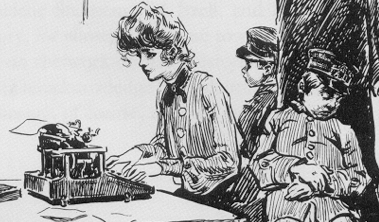
The history of the information age is about more than just the electronic digital computer. It is the story of a wide range of human activities, scientific practices, and technological developments. The story begins in the early 19th century with the emergence of new demands for communications and information management — from scientific researchers, expanding government bureaucracies, and increasingly national and international corporations. It includes not only “computers’’ (itself a large and diverse category) but data processing, communications, and visualization technologies, as well as people, practices, and organizational structures. In this new graduate seminar, we will explore the history of computing and communications in all of its forms and varieties. We will situate the computer in the broader history of technology, but also consider it from the perspectives of the history of science, labor history, and social history.
Download the syllabus.
March 22, 2011
#publications
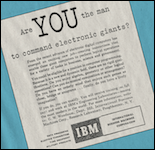
In this month’s Communications of the ACM, I have a short “historical reflection” on the recruitment and training of programmers in the 1950s. The essay is a short gloss of the material covered in chapter two of The Computer Boys Take Over, “Chess-players, Music-lovers, and Mathematicians.”
Among other things, it discusses the use of aptitude tests and personality profiles to identify programmer talent. Employers didn’t quite know what they were looking for, other than the “twinkle in the eye,” the “indefinable enthusiasm,” that marked those individuals possessed by “the programming bug that meant…we’re going to take a chance on him despite his background.”
March 01, 2011
#teaching

This summer I will be teaching once again my course on contemporary issues in computer culture and policy. The course explores the various social implication of information technology: social, cultural, political, and economic. By considering by a wide variety
of perspectives on the Information Revolution, we examine the relationship between new information technologies and changing notions of community, identity, property, and democracy. Topics will include intellectual property
rights, Linux and the free software movement, cyber libertarianism, and the rise
and fall of the dot.com economy.
Download the most recent version of the STSC 465 syllabus in PDF form
February 26, 2011
#media
On February 28 I will be giving a talk at Stanford on gender issues in the history of the computing professions. The seminar is being jointly hosted by the program in Science, Technology, and Society (STS), the History and Philosophy of Science and Technology (HPST) Program, and the Clayman Institute for Gender Research.
More details available here, and the full winter schedule for the STS seminar series is here.
Postscript: Although most academic talks go relatively unnoticed, in this case I got a nice write-up in the local newspaper. The slides from the talk are now available online.
January 27, 2011
#teaching

Free speech, free software, MOOS, MUDs, anime and cyberpunk. All of these are elements of a broad set of social, technical and political phenom- ena generally associated with the emergence of a nascent “cyberculture.” In this seminar we explore the ways in which recent developments in information technology – the computer and the Internet in particular – relate to changing contemporary notions of community, identity, property, and gender. By looking at an eclectic collection of popular and scholarly resources, including film, fiction and the World Wide Web, we will situate the development of “cyberculture” into the larger history of the complex relationship between technology and Western society.
STSC 260 Syllabus
January 27, 2011
#publications
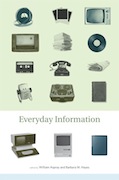
Last year I worked with two students at the School of Information at Indiana University on a piece called “Sports Fans and their Information Gathering Habits: How Media Technologies Have Brought Fans Closer to Their Teams Over Time.” The piece has just been published in a collection edited by William Aspray and Barbara Hayes called Everyday Information: The Evolution of Information Seeking in America.
Our contribution to the volume provides an overview of sports media in the United States over the 19th and 20th century, and focused specifically on the emergence of fantasy sports leagues.
January 27, 2011
#media
#research
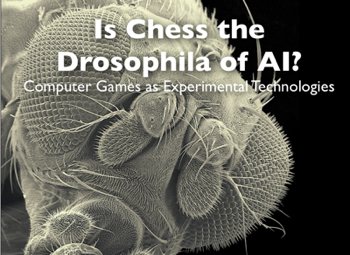
A couple of years ago I presented a paper at the University of Minneapolis on my ongoing research project on computerized decision models. Although the paper was ostensibly about computer chess, the talk took a conceptual turn, and focused on what I am calling the “politics of the algorithm.”
Since then I have given several different versions of this talk
The chess project will soon be published in the Social Studies of Science. In the meantime, here are the slides from the talk (recently updated), which I am posting as part of experiment in making aspects of my academic research more widely available.
November 21, 2010
#publications

Actually, the computer boys have lots of websites. But my book, The Computer Boys Take Over
Computers, Programmers, and the Politics of Technical Expertise now has its own website.
September 12, 2010
#media
#research
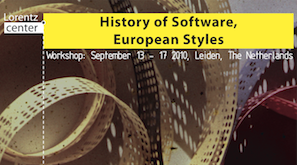
On September 13 I will be giving a keynote address at the Software for Europe conference at the Lorentz Center
for the Sciences in the Netherlands. The talk will focus on the work practices of computer operators in the
late 1950s and early 1960s. Among other things, I will argue that computing is a much more human activity that
we might otherwise imagine, even in the era of electronic computing. There were hundreds of thousands of
computer workers employed in the first two decades following the invention of the electronic computer, and the
“human element” in computing was frequently identified by contemporaries as the critical challenge facing
the future of the commercial computing industry.
September 09, 2010
#publications
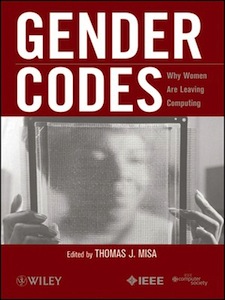
A new anthology exploring the history and sociology of women in computing that developed out of the Charles Babbage Institute conference is now available from Wiley. My contribution is a chapter called “Making Programming Masculine.” The volume is edited by Thomas Misa of the Charles Babbage Institute, and is called Gender Codes: Why Women Are Leaving Computing. A draft version can be found here. The Gender Codes book can be ordered on Amazon.









